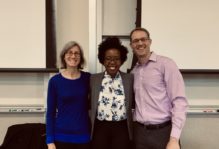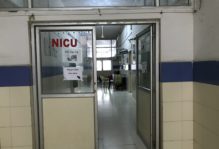Field Work in South Africa? COVID-19 Had Other Plans, but IJL Continued to Make Progress
By Bilen Zerie ’23
Planning a Research Itinerary in South Africa
When I first received notice that I had been selected as a GRI Summer Fellow, I had a very different idea of what my summer would look like. I was paired as a faculty fellow with Professor Zvobgo, whom I have been working under within the International Justice Lab, aka IJL, for the past year. The funding from the GRI would have been used to support three weeks of field work in South Africa, and then seven weeks of remote research later in the summer. Along with three of my IJL team members, I planned to assist with intensive interviews and focus groups of local government and civil society leaders. Our itinerary consisted of visits to Johannesburg, Cape Town, and Pretoria, where we would collect this qualitative data while possibly engaging in a little sight-seeing on the side. Mostly, I was excited to interact with scholars and practitioners on the ground who could share valuable first-hand experiences and insights.
Around late March, it became clear that summer travel was off the cards. Although I was a bit disappointed that IJL would not be travelling to South Africa in May, I ultimately felt immensely grateful to the GRI Summer Fellows Program for permitting the fellows to work remotely. In this time of instability, I feel lucky to have had the opportunity to spend ten weeks working for IJL on issues that I am passionate about.
The International Justice Lab & Summer 2020
For context, IJL is primarily focused on human rights, transitional justice, and international law. This summer, I researched, coded, and compiled datasets for Professor Zvobgo’s book project titled “Governing Truth: NGOs and the Politics of Transitional Justice,” which analyzes how domestic and international civil society members influence truth commissions. Truth commissions are temporary bodies established in order to investigate a series of human rights abuses. After their conclusion, these commissions typically release a final report which includes recommendations for specific reforms and policies that should be implemented in order to repair harm and prevent reoccurrence.
When governments fail to take action in implementing these recommendations, civil society members pick up the mantle and engage in advocacy. This summer, we looked specifically at NGOs and their activism efforts around the South African Truth and Reconciliation Commission (SATRC). To track this, we examined different areas of recommendations made by the TRC, such as trials, exhumations, and memorialization. For each of these 22 substantive areas, we first compiled lists of which domestic and international NGOs were working on these areas prior to the release of the SATRC’s final report in 1998. This allowed us to determine the strength of the initial civil society sector leading up to the transitional justice process in South Africa.
Following that, we then looked at advocacy from NGOs in the ten year period following the release of the final report, so from 1998-2008. Within this time range, we tried to find civil society members who may have been inspired by the TRC to add different advocacy areas to their portfolios. We also coded on a more micro level and determined which NGOs, if any, were working to advance the goals of each individual recommendation listed within the report. An additional variable asked whether NGOs specifically mentioned the TRC when lobbying for certain recommendations in order to strengthen their demands to the government.
Unfortunately, before this point there has been little to no comprehensive data available on how civil society advocacy impacts and is impacted by transitional justice, even though it is clear that they are a crucial aspect of the process. The research that my team and I conducted this summer provides in-depth insight into NGOs and their efforts to continually and tirelessly fight on behalf of the interests of victims. Finally finishing my coding for South Africa and entering it into the master spreadsheet was a gratifying experience because I know that the data I collected is truly useful and necessary.
Staying Connected while Researching Remotely
After long days spent examining outdated websites of NGOs and digging through links on the 11th page of Google, it was always nice to check in with Professor Zvobgo and the rest of IJL during our weekly Monday afternoon Skype meetings. When we weren’t discussing the coding and asking any clarifying questions, we were recommending our recent favorite Netflix shows, or debating who we thought Joe Biden should pick as his running mate. Work seems a bit less like work when you have a great team to do it with, and I certainly do. To IJL and the GRI Summer Fellows Program — thank you for allowing me to further my passions, pursue my goals, and grow personally and intellectually. I am forever thankful.




No comments.
Comments are currently closed. Comments are closed on all posts older than one year, and for those in our archive.